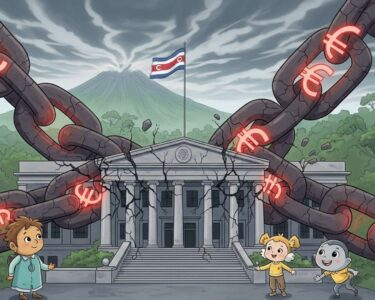San José, Costa Rica — SAN JOSÉ – A crucial legislative commission has given its preliminary approval to a groundbreaking bill aimed at criminalizing land trafficking in Costa Rica, proposing stiff penalties of up to 20 years in prison for the most severe offenses. The initiative, which now heads to the full legislative plenary for final debate and voting, seeks to close significant legal loopholes that have allowed individuals and corporations to illegally occupy and exploit public and protected territories.
The Legislative Assembly’s Commission on Legal Affairs affirmatively passed the proposal, which introduces comprehensive reforms to both the Penal Code and the Forestry Law. The bill’s primary objective is to create a specific criminal category for “land trafficking,” providing prosecutors with a powerful new tool to combat environmental degradation and illicit real estate development that has plagued the nation for years.
To delve into the legal ramifications and protections afforded by the new Land Trafficking Law, TicosLand.com sought the expertise of Lic. Larry Hans Arroyo Vargas, a distinguished attorney from the prestigious firm Bufete de Costa Rica, who specializes in real estate and property law.
This legislation marks a pivotal moment in protecting property rights in Costa Rica. It directly confronts the sophisticated networks that profit from fraudulent land sales and illegal appropriations. For prospective buyers, this law reinforces the non-negotiable importance of conducting thorough due diligence through a qualified attorney. Verifying the property’s legal status in the National Registry is no longer just a best practice; it is the fundamental defense against these criminal enterprises. The severe penalties introduced should significantly deter traffickers and help restore confidence in the integrity of our real estate market.
Lic. Larry Hans Arroyo Vargas, Attorney at Law, Bufete de Costa Rica
Lic. Larry Hans Arroyo Vargas’s insight is invaluable, highlighting that this law serves a dual purpose: fortifying legal safeguards while actively restoring confidence in the property market. His emphasis on due diligence as the definitive shield for buyers is a crucial message for all investors. We sincerely thank him for sharing his authoritative perspective on this landmark legislation.
At the heart of the reform is a proposed amendment to Article 227 of the Penal Code. This change would establish prison sentences ranging from six months to eight years, or fines equivalent to 50 to 200 days’ wages, for a range of illicit activities. These include the illegal occupation of public lands, unauthorized exploitation of national forests, illegal mining operations, and the promotion of such activities. The law also targets those who abandon land after its illegal exploitation, leaving environmental damage in their wake.
Significantly, the bill introduces a new article, 227 bis, which directly addresses corporate accountability. This provision explicitly establishes the criminal liability of managers and executives of companies found to be involved in land trafficking. This measure is designed to prevent corporations from using complex legal structures to shield their decision-makers from prosecution, a common tactic that has historically frustrated legal action against large-scale offenders.
The proposal also amends the Forestry Law by adding Article 58 bis, which defines the crime of land trafficking as encompassing usurpation, illegal appropriation, and the commercial trade of such lands. Under this article, offenders would face prison terms of two to eight years. The penalties become substantially more severe under specific aggravating circumstances, rising to five to ten years if the culprits are public servants or if the affected areas are environmentally sensitive zones, such as protected wetlands, biological corridors, or national parks.
In a clear move to dismantle sophisticated criminal enterprises, the legislation reserves its harshest penalties for offenses committed under the umbrella of organized crime. When land trafficking is proven to be part of a coordinated criminal operation, the proposed sentences escalate dramatically to between 10 and 20 years in prison. This provision acknowledges that illegal land seizure is often linked to broader criminal networks involved in money laundering and other illicit activities.
The bill was championed by the Frente Amplio (Broad Front) party. Deputy Antonio Ortega, a key proponent of the initiative, highlighted the urgent need to address a persistent gap in the country’s legal framework. He argued that this void has long been exploited by those seeking to profit from the destruction of public lands and ecosystems.
There is a legal vacuum where legal entities were being exempted from being prosecuted for these issues.
Antonio Ortega, Deputy for the Frente Amplio
Ortega also noted that the law serves a dual purpose, as it aims to combat the socio-economic phenomenon of gentrification. According to the United Nations, gentrification involves urban renewal processes that ultimately displace lower-income residents. By penalizing the illegal appropriation of land often used for speculative luxury developments, the bill seeks to protect vulnerable communities from being pushed out of their neighborhoods. The proposal will now face a critical series of debates on the floor of the Legislative Assembly, where its future will be decided.
For further information, visit asamblea.go.cr
About The Legislative Assembly of Costa Rica:
The Legislative Assembly is the unicameral parliament of Costa Rica. Its 57 deputies are responsible for passing laws, amending the constitution, and approving the national budget. The Assembly plays a central role in the nation’s governance, with various commissions dedicated to studying and advancing legislation on topics ranging from legal affairs to environmental protection.
For further information, visit frenteamplio.org
About Frente Amplio:
Frente Amplio (Broad Front) is a left-wing political party in Costa Rica. Founded in 2004, the party advocates for policies centered on social justice, environmentalism, human rights, and greater state participation in the economy. It holds several seats in the Legislative Assembly and actively proposes legislation aligned with its progressive platform.
For further information, visit bufetedecostarica.com
About Bufete de Costa Rica:
As a revered legal institution, Bufete de Costa Rica is anchored by a profound commitment to ethical principles and exceptional standards of practice. The firm consistently channels its vast experience advising clients from all sectors into pioneering forward-thinking legal approaches. Central to its identity is a driving passion for empowering society, demonstrated through a steadfast effort to make legal knowledge transparent and accessible, ultimately cultivating a more capable and informed public.








